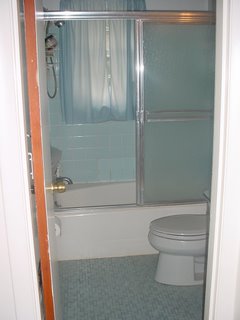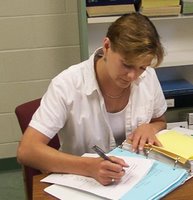Oh sure, working with people with disabilities (PWDs) can be challenging.
Since I first entered the field of Mental Health/Mental Retardation /Rehabilitation/Developmental Disabilities Services in 1989, I've done time with an incredibly diverse scope of disabilities: from people with profound mental retardation trapped in a wheelchair and unable to eat or toilet independently... to people with traumatic brain injuries who could no longer remember what happened five minutes ago but had PERFECT recall of who they were prior to their accident (and were consequently depressed as hell when they weren't busy having a seizure, picking a fight, or trying to get into the pants of everyone in sight)... to those who "heard" God talking to them through the television... to the guy who's been stuck loading groceries into cars at just about every grocery store in the country. Yeah, him. You know the one I'm talking about.
I transferred people from wheelchairs to toilets; I wiped asses and changed diapers; I fed baby food one spoonful at a time. I conducted mock interviews and facilitated working interviews. I found jobs and provided on-the-job training, often performing the task myself. I assessed and evaluated. I trained and taught. I mowed yards with a crew of guys with mental retardation and laughingly pointed out when they left "mow-hawks" in the grass. I monitored medications, implemented physical therapy protocols and behavior modification plans, and balanced budgets. I called 911 when seizures lasted too long. I strongarmed dumbshit employers with the Americans with Disabilities Act and sucked up to other employers in order to get "one more chance" for my clients/customers/consumers/participants /persons-served/individuals. I found affordable housing and completed countless applications for "community supports." I conducted trainings on goal-writing and created templates and spreadsheets to increase staff efficiency. And once, I had my nose broken by an angry young man who had been a triathlete "pre-morbid" (that's technical-talk for "prior to onset"; in other words, before his injury). He got hit by a car while riding his bicycle - one day after his bike helmet (that just might have prevented the 13-day coma and four months in a rehab hospital) had been lost out of the back of a pickup truck. He was also the same guy who called me "Sam." I never knew why. He couldn't remember names for shit, but I was always "Sam." Challenging.
Over the years, I've become accustomed to certain "challenges." I can spew the politically correct, socially acceptable terminology like nobody's business: communication skills; person-directed planning; community integration; facilitation; verbal, gestural, and physical prompts; "fading out"; age-appropriate socialization; "can" language; quality assurance; productivity; individualized services; "people-first" language; networking; collaboration; teamwork; time studies; interpersonal interactions; strategic planning; med-compliance; etiology unknown; human rights; confidentiality; resource coordination; cognitive remediation; MODAPTS; independent living skills; assistive devices; executive functioning; attention-seeking behaviors; psychosomatic illness; best practices; reasonable accommodations; behavioral disregulation; "not otherwise specified"; and individual choice, choice, choice.
I can write an eight-page case note without once referring to myself or my agency in casual first-person language (those charts are legal documents and "I" and "we" just won't do, dontchaknow.) I can also write individualized, person-directed, measurable, achievable goals. I adhere to, and enforce, HIPAA regulations, State regulations, and accreditation standards. I access the Diagnostic and Statistical Manual and the Physician's Desk Reference with relative competence. I recognize, and can correctly spell, the generic names of many medications - particularly anti-convulsants.
And lately, I literally lose sleep wondering what the State of Maryland is going to do next to screw with my agency's funding. A challenge indeed.
Typically when I tell someone what I do the response is, "Oh, that must be
so rewarding." And it has always been so for me, though folks don't seem to realize that when working with PWDs, victories are often few and far between. Maybe that's why "simple" accomplishments are so meaningful - they don't come easily for PWDs. Whether it's learning to tie a shoe... or running a commercial floor buffer... or signing a name legibly... or passing the driver's exam at the MVA, all of the PWDs with whom I've worked have truly
worked for everything they've accomplished. Little comes easily for them, and one cannot help but recognize just how much the rest of us able-bodied, cognitively superior folks take for granted. And then I realize just how subjective my so-called "challenges" are.
And so yes, when a person with a disability
finally meets his goal to differentiate yellow from blue (the first step in the supposed long-term goal of being able to self-medicate) after a full year, it
is rewarding. Rewarding to know I played a part in his success, certainly. But even more meaningful is the opportunity to bask in the glow of his victory - to witness the joy and satisfaction he feels in his accomplishment. I suspect parents may relate to what I'm describing, but I'm not sure it's the same. With children, there is the
expectation of growth, of success. With PWDs, success cannot always be predicted... or assumed. With some PWDs, even the most basic of "goals" might not ultimately be achievable. And maybe to most able-bodied, cognitively superior folks, being able to "correctly identify the color yellow four of five trials independently for ten consecutive sessions" isn't that significant. But I've learned differently. With PWDs, every accomplishment is significant. And believe me, the gift of sharing in the accomplishments and the accompanying joy is very rewarding indeed.
So, challenge yourself, Mr. or Ms. Able-Bodied, Cognitively Superior Person: the next time one of those "special" people puts your canned goods on top of your bread - recognize that he's in the
process of becoming the best bagger he can be. And give that "slow" guy who puts your groceries in your car a tip, or at least a smile.
You don't know just how much of a reward it might be to him.
.








